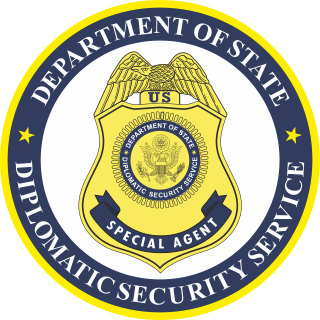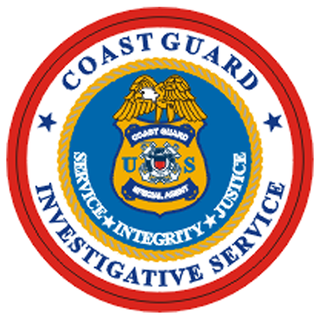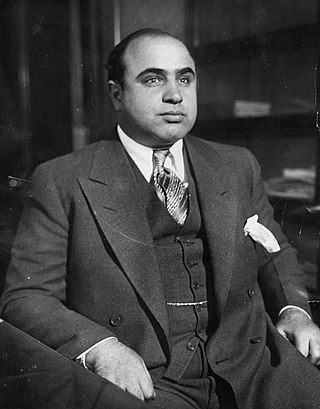
The Federal Bureau of Investigation (FBI) is the domestic intelligence and security service of the United States and its principal federal law enforcement agency. An agency of the United States Department of Justice, the FBI is also a member of the U.S. Intelligence Community and reports to both the Attorney General and the Director of National Intelligence. A leading U.S. counterterrorism, counterintelligence, and criminal investigative organization, the FBI has jurisdiction over violations of more than 200 categories of federal crimes.

In law enforcement, a sting operation is a deceptive operation designed to catch a person attempting to commit a crime. A typical sting will have an undercover law enforcement officer, detective, or co-operative member of the public play a role as criminal partner or potential victim and go along with a suspect's actions to gather evidence of the suspect's wrongdoing. Mass media journalists occasionally resort to sting operations to record video and broadcast to expose criminal activity.

The FBI Ten Most Wanted Fugitives is a most wanted list maintained by the United States's Federal Bureau of Investigation (FBI). The list arose from a conversation held in late 1949 between J. Edgar Hoover, Director of the FBI, and William Kinsey Hutchinson, International News Service editor-in-chief, who were discussing ways to promote capture of the FBI's "toughest guys". This discussion turned into a published article, which received so much positive publicity that on March 14, 1950, the FBI officially announced the list to increase law enforcement's ability to capture dangerous fugitives. The first person added to the list was Thomas J. Holden, a robber and member of the Holden–Keating Gang on the day of the list's inception.

A fugitive is a person who is fleeing from custody, whether it be from jail, a government arrest, government or non-government questioning, vigilante violence, or outraged private individuals. A fugitive from justice, also known as a wanted person, can be a person who is either convicted or accused of a crime and hiding from law enforcement in the state or taking refuge in a different country in order to avoid arrest.

The Bureau of Diplomatic Security, commonly known as Diplomatic Security (DS), is the security branch of the United States Department of State. It conducts international investigations, threat analysis, cyber security, counterterrorism, and protection of people, property, and information. Its mission is to provide a safe and secure environment for officials to execute the foreign policy of the United States.

The Diplomatic Security Service (DSS) is the principal security and law enforcement agency of the United States Department of State (DOS). As the operational division of DOS' Bureau of Diplomatic Security, its primary mission is to provide security to protect diplomatic assets, personnel, and information, and combat visa and passport fraud. DSS also conducts counterterrorism, counterintelligence, cybersecurity and criminal investigations domestically and abroad.

The National Crime Information Center (NCIC) is the United States' central database for tracking crime-related information. The NCIC has been an information sharing tool since 1967. It is maintained by the Criminal Justice Information Services Division (CJIS) of the Federal Bureau of Investigation (FBI) and is interlinked with federal, tribal, state, and local agencies and offices.
Most Wanted may refer to:

The Coast Guard Investigative Service (CGIS) is a division of the United States Coast Guard that investigates crimes where the U.S. Coast Guard has an interest. It is composed of civilian (GS-1811), active duty, reserve enlisted, and warrant officer special agents.

"Public enemy" is a term which describes individuals whose activities are seen as criminal and extremely damaging to society, including pirates, highwaymen, bandits, mobsters, and similar outlaws.
The Federal Bureau of Investigation (FBI) has been a staple of American popular culture since its christening in 1935. That year also marked the beginning of the popular "G-Man" phenomenon that helped establish the Bureau's image, beginning with the aptly titled James Cagney movie, G Men. Although the detective novel and other police-related entertainment had long enthralled audiences, the FBI itself can take some of the credit for its media prominence. J. Edgar Hoover, the Bureau's "patriarch", took an active interest to ensure that it was not only well represented in the media, but also that the FBI was depicted in a heroic, positive light and that the message, "crime doesn't pay", was blatantly conveyed to audiences. The context, naturally, has changed profoundly since the 1930s "war on crime", and especially so since Hoover's death in 1972.

Transnational organized crime (TOC) is organized crime coordinated across national borders, involving groups or markets of individuals working in more than one country to plan and execute illegal business ventures. In order to achieve their goals, these criminal groups use systematic violence and corruption. Common transnational organized crimes include conveying drugs, conveying arms, trafficking for sex, toxic waste disposal, materials theft and poaching.
In law enforcement, a manhunt is an extensive and thorough search for a wanted and dangerous fugitive involving the use of police units, technology, and help from the public.
The following outline is provided as an overview of and introduction to law enforcement:

Omid Tahvili is an Iranian-Canadian sexual offender and kingpin of an organized crime family in Canada which is connected to various international crime organizations. In April 2008, Forbes.com, after consulting with law enforcement agencies around the world, listed him as one of the world's ten most wanted fugitives.

The Federal Investigation Agency is a border control, criminal investigation, counter-intelligence and security agency under the control of the Interior Secretary of Pakistan, tasked with investigative jurisdiction on undertaking operations against terrorism, espionage, federal crimes, smuggling as well as infringement and other specific crimes.

The Fugitive Felon Act, abbreviated FFA, is a United States federal law that criminalizes interstate flight in order to avoid prosecution or giving testimony in state felony proceedings, a crime termed unlawful flight.
The Most Wanted is a most wanted list maintained by India's National Investigation Agency (NIA). Individuals usually are removed from the list only when they are captured or die or the charges against them are dropped.
Operation Captura is a multi-agency operation to detain criminals wanted by UK law enforcement who are hiding in Spain. In particular, the National Crime Agency (NCA) and crime-fighting charity Crimestoppers launch appeals—the ninth was launched in 2015—seeking Britain's most wanted fugitives, aiming for maximum news media coverage. While UK agencies have no mandate to operate outside the UK, the operation provides anonymous call facilities in Spain, seeking to locate suspects for whom a European Arrest Warrant has been issued, who can then be arrested by local law enforcement and their extradition to the UK sought. Spanish law enforcement: the Fugitive Location Group of the National Police and the Manhunt Squad of the Guardia Civil, actively cooperate with the operation.













